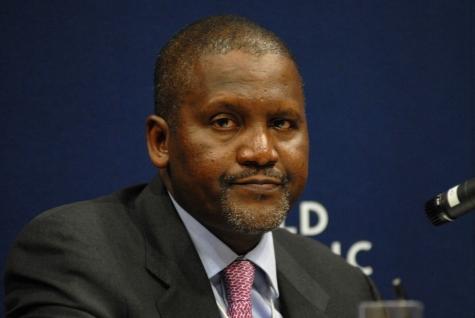
Dangote Cement Plc is alleging that Ibeto Cement Company is gaining undue advantage by evading taxes.
While awaiting the decision of the Appeal Court whether or not to commence hearing of suit filed by Dangote Cement Plc against Ibeto Cement Company, a Federal High Court sitting in Lagos has adjourned till 1 November.
Dangote Cement Plc is alleging that Ibeto Cement Company is gaining undue advantage by evading taxes. The Federal Government, however, is contending that Dangote Cement Plc is plotting to wipe out fair competition and create a monopoly in the industry. Other defendants in the suit include IBG Investments Limited, Derima Ventures Limited, Federal Government, Attorney-General of the Federation and the Federal Ministry of Finance.
Also joined as defendants are the Federal Ministry of Trade and Investment, Board of Customs and Excise, Federal Inland Revenue Service and Nigerian Ports Authority.
The court action to determine whether or not to hear the suit will be predicated on the appeal filed by Ibeto Cement Plc against the decision of the court to commence hearing despite the objection of the defendants that Abuja is the proper place to institute the legal action. The objection is based on the fact that none of the defendants, except Nigeria Ports Authority, is resident in Lagos. Similarly, none of the acts leading to this suit were carried out in Lagos State.
But the court, in its ruling, declared that any part of the country is the constituency of the Federal Government and as such, a legal action can be instituted in any part of the country against the Federal Government and its agencies. Dissatisfied with the ruling, Ibeto Cement Plc filed an appeal.
Dangote Cement Plc, in the suit filed by its lawyer, Mr. Oluwakemi Balogun (SAN), is seeking a declaration of the court that the President and Commander-in-Chief of Armed Forces of Nigeria, lacks the power to waive, alter, amend, and/or revise the provisions of the Value Added Tax Act, Cap. V1, Laws of the Federation, 2004, without the approval of the National Assembly.
It also seeks an order of perpetual injunction against the Ibeto Cement Company, IBG Investment Limited, Derima Ventures Limited and their agents from claiming any reliefs, exemption and/or tax waiver under Circular No.BD/12237/S.510/166 of 2007.
In addition, Dangote Cement Plc is seeking an order of perpetual injunction against the three defendants from importing any quality of bulk or bagged cement except as newly approved by the appropriate authority under the current fiscal tax policy stipulation and an order directing the three defendants to repay the sum of $40 million, and N1.9 billion to the Federal Government.
The sums, Dangote Cement Plc contended, are the aggregate of what Ibeto Cement Company, IBG Investment Limited and Derima Ventures Limited fraudulently obtained.
Equally being sought is an order of perpetual injunction against the three defendants, their agents and privies from claiming any reliefs, exemptions and/or tax waivers under Circular No.BD/12237/S.510/166 of 2007, in reference to the three defendants.
In an affidavit sworn to by one Ekanen Etim, principal officer, Dangote Cement Plc, the company alleged that in 2002, the Federal Government formulated the backward integration policy through which quotas for cement importation were to be allocated based on proven investment by operators in the industry, a qualification Dangote Cement claimed Ibeto and the two other defendants in the suit never had.
Dangote further alleged that having misrepresented its level of compliance with the policy, Ibeto was granted an import allocation of 800,000 metric tons. Following a petition by Dangote Cement, former President Olusegun Obasanjo issued a directive that Ibeto was not allowed to import cement until it provided incontrovertible proof of its investment in local production.
But when the government of the late President Umaru Yar’ Adua succeeded Obasanjo’s, Ibeto, in July 2007, applied for import allocation, falsely claiming to have met the stipulated conditions. It was subsequently granted an allocation of 1.5million metric tons of cement per annum at 5% import duty and tax free under the backward integration policy.
On account of this, Dangote Cement petitioned former President Yar'Adua, alleging unfair advantage. The former president then directed all cement importers to operate under the same concessions.
Dangote Cement Plc also alleged that barely four days after the policy was issued, Ibeto Cement Company peremptorily sought a restraining order from the court and deliberately and fraudulently suppressed the fiscal policy regime of 2008, 2009 and 2010.
Ibeto further filed terms of settlement, which were entered as consent judgment in the suit, but deliberately suppressed the fiscal policy.
In line with the consent judgment, the three defendants were to continue to import 1.5million metric tons of cement per annum for the period between 1 October, 2007 and 30 September, 2017. This was in line with the Federal Government guarantee conveyed a letter by the Ministry of Trade and Industry dated 5 June 2002.
By the judgment, the Federal Government was to pay Ibeto Cement Company the sum of $40 million and N1,885,813,592(N1.9billion) being the verified claims by the inter-ministerial committee for losses suffered by Ibeto from the unjustified closure of its bagging plant between December, 2005 and when it resumed operations in October, 2007.
Dangote Cement Plc averred that its rights and interests were affected by the consent judgment and evasion of taxes by the three companies. It argued that its locally manufactured cement Dangote was made artificially more expensive when compared with those imported by Ibeto Cement company, IBG Investment Limited and Derima Ventures Limited, who allegedly evaded taxes.
The Federal Government and six of its agencies, which are the other defendants in their counter-affidavit deposed to by one Emmanuel Joel, an Assistant Litigation Officer in the law firm of Kenna Partners, contended that Dangote Cement Plc's suit was designed to wipe out competition and leave it as a monopoly.
The government said it viewed the cement industry as very crucial to its policy of addressing infrastructure decay in the country and was determined to create and maintain a level playing field. It also averred that Dangote's claims are anti-competition and designed to control the entire cement industry, leaving Nigerians at its whims and caprices. It therefore considered Dangote's application as baseless, asking that it be dismissed with substantial costs awarded against the firm.
The government equally averred that Dangote was neither a party in the suit instituted by Ibeto Cement against the Federal Government nor was the consent judgment obtained by fraud. It argued that Dangote Cement was not a nominee or agent of government agencies, which are defendants in the suit, and is not acting on their behalf. It argued that that Dangote Cement Plc is not an agency of Federal Government with the statutory mandate of administering, managing or enforcing tax compliance, therefore lacking the locus standi to commence or maintain the legal action and seek the reliefs in the case.
It further stated that, after due consideration of the merit of Ibeto Cement's appeal and upon satisfaction that it had complied with relevant requirements for the granting of import license, former President Yar’Adua granted approval to and conferred certain rights on Ibeto Cement, as contained in the 25 July, 2007 letter by the Federal Ministry of Commerce and Industry.
Ibeto Cement Company, IBG Investment Limited and Derima Ventures Limited, in a counter-affidavit deposed to by Peter Ojih, a senior litigation officer in the law firm of Falcon Chambers, alleged that following fresh efforts to create an oligopoly/monopoly, some industry top guns forced an alteration of government policy contrary to the terms of the letter of 25 July, 2007.
Ibeto Cement Company then instituted a suit (FHC/ABJ/CS/459/2010) against the Attorney-General of the Federation, saying it did not conceal any presidential directives. The company averred that the consent judgment was not procured through fraud and maintained that Dangote Cement Plc does not have any right or liability under or by virtue of the said consent judgment.
Contrary to Dangote’s claim in its affidavit that its rights and interests were affected by the consent judgment, Ibeto argued that they were not affected, as Dangote Cement Plc is not the government agency responsible for tax and tariff administration.
Equally, it described Dangote Cement Plc’s cause of action, being rooted in taxation, as constituting a gross abuse of court process. The presidential and ministerial circulars, Ibeto added, were not made for the sole benefit of Dangote Cement Plc and that its interest was not affected and will not be prejudiced if its application is dismissed.
It similarly argued that Dangote Cement Plc is also entitled to tax waivers granted to the defendants by reason of the consent judgment.
Consequently, Ibeto Cement urged the court to dismiss Dangote Plc’s suit.
